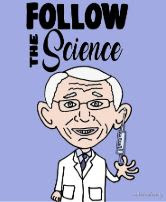Follow The Science
College chemistry kicked my butt—but I did pass, barely. Next up was ORGANIC Chemistry. No way would I pass that! And my ‘advisor’ made that abundantly clear to me. -- 'An Einganeer's Tale', page 20
But two months after receiving my last pay check, I was at home, locked in like everyone else, because some Homer somewhere didn’t close the door and let the COVID out. --'An Einganeer's Tale', page 72
Engineering can broadly be defined as the practical application of science. So I guess by definition, engineers follow the science. I've never been that good at following science (or anything else for that matter). I believe the best engineers don't really follow the science, they challenge it.
The scientists we are most familiar with are medical doctors. We go to them expecting them to know everything and prescribe for us what will work to make us well. I am always amazed when I realize how much doctors don't know. They say, well it could be this or that, then put you through a bunch of tests which are mostly negative or inconclusive. They eventually give you a diagnosis, expressed as some percentage of what it might be. Then they recommend medications and/or treatments, each also expressed as a percentage of whether it might be effective, as well as percentages on the possibility of your suffering the side effects.
To any one individual everything a doctor does and prescribes is really either 0% or 100%, true or false, either it works or it doesn't. Engineering is also a 0% / 100% game. Engineers cannot afford to express the success of their solutions as a percentage. In my career, I found that when I deviated from this principle, when I said some variables may be more or less important in predicting future operations, the solutions I presented became more questionable and therefore more suspect and less useful. Engineers must take a stand, and then live or die on their decision.
It's been five years since the world was rocked by the biggest screw up of our generation, the COVID-19 pandemic. I guess the origins still remain undetermined, but I lean towards someone somewhere making a huge mistake. But whatever, in response to this calamity most everyone did as they were told and followed the science. We stayed six feet apart based on some scientific spray tests. We took the vaccine even though it was thought to only work for maybe 65% of us at the time. We then also gave it to kids because there might be a <1% chance of it being useful for them We closed schools because there was a chance teachers could be infected by children showing no signs of the infection. We wore masks for... I'm not sure why. Still, almost 1.2 million people died in the US, 90% of which were over the age of 50; 67% over 65.
To repeat my first sentence, engineering can broadly be defined as the practical application of science. The most important word here is practical, not in it meaning actual, but in it meaning sensible. Some governors took the sensible approach. Although they were profusely criticized at the time, their outcomes were no worse and for some better than those who followed the science.
During the pandemic many people sent home questioned why their work was deemed not essential. They had thought what they did was important. Most engineers sent home continued doing their non-essential work from home. If only more of those workers not sent home had been engineers.


